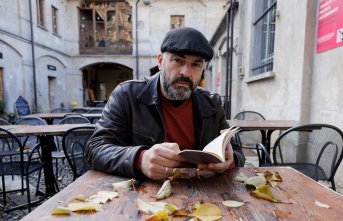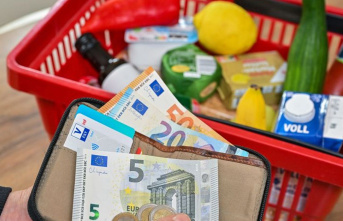"The best way to pick with your bare hands a nettle to? You do it quickly!" declared Izzy "Fizzy" Johnson. From the Sunny hedge on the edge of a path in Tottenham in North London, the 24, grab-Year-old, the young leaves from the upper part of the stem. Sent to you rolled one of the leaves like a cigarette, with the underside of the leaf up to the top. So you are holding the needle like hairs that sting and remote burn if you touch it, your skin. Now you can form a firm ball out of the green fabric.
"So you eat a raw nettle," she says, while she pushes the plant ball quickly between the teeth. And this is the best way to get the Maximum nutritional value of a Plant rich in iron and Vitamin A, and more Protein than spinach.
read more: Coronavirus: India's curfew endangers water supply in Delhi's Slums
"To me, as these long, green beans tastes like, but this is of course different for everyone," says Johnson, who normally organizes under the name of "Benevolent Weeds" walks in which edible plants collected.
The Lockdown on may 23. March in the UK and is now easing was started, residents of many city opened the eyes and, of all things, for the fruits that will bloom in the spring in your neighborhood, and otherwise simply overlooked.
In March, the urban collectors have started to combine their daily allowable output for the grocery shopping and movement. You can now collect nettles for example, elder flowers, dandelion, rare spring mushrooms, sour BlackBerry leaves, anise-like meadows-Chervil, and plenty of wild garlic from the bushes, on river banks and in wetlands.
even before the COVID-19-crisis began, has been the urban food is becoming more popular, says Wross Lawrence, author of "The Urban Forager: Find and Cook Wild Food in the City".
read more: organic food: cities promote healthy eating
As the London were suddenly faced with long, empty days, and abandoned roads, and untrimmed hedges, increased interest in the Collecting of the fruit. The biggest change during the look downs but, Lawrence says, was the changing way of thinking. "There are definitely more people out there that collect. I get a lot more news about the social media and a lot of friends ask me: "What is this or that for a leaf? I want to pick the Right one?" says Lawrence. "I think that the Lockdown has brought people more in touch with nature to."
crisis mentality
Many different people, such as restaurant chefs, Instagrammer, children and pensioners want to learn on the Internet by experienced collectors. Transferred to your collecting forays into social media, live, or share your Know - how Johnson is in talks on the platform of the Zoom.
Kim Walker is such a thing as a "food collection-teacher" and graduate student at the Royal Botanic Gardens in Kew. He says that people who are forced to stay most of the time at home, have a lot of reasons to come out and collect wild plants.
"One of these reasons is, that we all feel this fear of the future - the economic future. Where is our food? The people are now know perhaps more interested in what food train are in the wild are edible, if you come in a Situation to survive in the it comes."
According to a study from the year 2017, the interest in wild food reaches search in the difficult time of its peak. The study deals with the 2008 recession, highlighting how the Knowledge of the food which can support the resilience of the community in social and economic crises.
read more: Peru: fruit and grow vegetables - without the slash-and-burn
But most of the collectors, of the science they are learning in the field of pirates called, rather a way to discover the slow-changing environments and times of the year to practice mindfulness, to deal with herbal remedies or the mythical and folkloric stories to pursue, which are related to the native species, so Walker.
"is One of the philosophical questions on the origin of this crisis, how people live and why you feel cut off from nature," says Walker, "and this is due to the fact that we live in harmony with nature?"
hope and tastefood-supply chains could be obtained during the crisis, mostly in an upright position. However, due to the break from the hectic nine-to-five-everyday Londoners eager to learn in the cultivation of vegetables, Replacing plants, baking using sourdough and other activities in order to food with the own hands produce, instead of the commercial market.
Many of you have let your taste buds guide and the Trend to urban food picked up on search, so, too, are some chefs with Michelin star.
Rick Baker operates in Homerton, in East London, the Pop-up Pizzeria Flat Earth Pizzas, in which biological and self-collected ingredients are used.
read more: What is in front of Corona protects, is a Problem for the environment
Before the Lockdown Baker had proven success with the sale of a Pizza with chickweed and nettle tops, which were fried in brown Butter. He had, however, respond to the concerns of its customers because of the possible hazards with collected ingredients.
If the Restaurants are open again, he hopes for a local food system, to support the public desire, small businesses and food workers, with the euphoria about local food can connect.
"The industry in which I work, goes through hell," says Baker. "Hopefully it is the new normal that people are curious. You are now more willing to try things out. You know longer have to guess what is going on around them." He hopes that this time of reflection raises further questions about our food.
"It is a gradual process, people will not just up and leave in search of food," says Baker. "You will start the herbs on the window sill to grow, or Zucchini, or whatever. And then you can start asking more questions about where this stuff actually comes from?"
the Lost Knowledge back to winLondon is not the only place where the new appetite for wild food is visible, says Lukasz Luczaj, head of the botany Department at the University of Rzeszow, Poland. On his YouTube channel Luczaj was able to notice an increase in the collector in the whole of Europe, taking part in his lessons.
read more: How the Coronavirus pandemic, with the destruction of animal and plant world
depends on about 15 years Ago, he initiated a food collection courses in London and noted that the English, in contrast to Poland and its neighbouring countries, had lost much of their traditional collective culture.
"In the UK was the Gathering of mushrooms is not very popular," says Luczaj. "Maybe will be interested in after the Lockdown even more people."
Michael Green is a civil engineer and lives on the border of London to the County of Essex. He discovered years ago, his penchant for Collecting mushrooms and shares the photos of his finds on Instagram.
read more: Lockdown in India: farmers sell their harvest without any intermediary
Green works during the lock downs from home and has replaced his otherwise two-hour commuting through a long journey through forests and playing fields in the North-East of London. At the Passover Feast, the Green horseradish leaves, collected and distributed them, as the shops had at the beginning of the Jewish holiday, no bitter herbs, and otherwise serves as part of the Seder.
"I was so lucky to have this place on my doorstep. It is like a therapy to me," he says. "It helps me to slow down my everyday life. Otherwise I would be in a hurry to go somewhere, to get the Bus to go to work. But now I have an eye for herbs and plants popping up between the paving stones and wild flowers that grow in fallow land. This makes the city more interesting."
author: Matthew Ponsford
*The post "The wild plant collector, London: in search of food in times of lock downs" is published by Deutsche Welle. Contact with the executives here.
Deutsche Welle Date Of Update: 10 June 2020, 06:26










